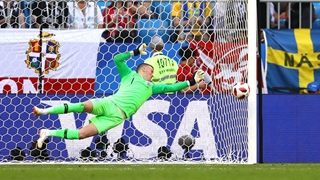
Winning and losing
The nature of tournament football means that only one team escapes the ultimate disappointment of defeat.
Sunday’s World Cup Final between France and Croatia will decide which team can decorate their tournament reflection with celebration and which team will join the other 31 nations in having to deal with more difficult feelings.
Gareth Southgate consoled each player and staff member in person on the Moscow pitch at full time on Wednesday night. More words of thanks, congratulation and positivity for the future will have followed in private.
Dealing with both winning and losing is a key part of the coaching process at all levels of the game and an issue discussed on FA coaching courses.
Providing a positive role model - both in success and disappointment - is crucial to young players, who, most often, take their lead from the behaviour of the coach.
Managing your own feelings in order to act as an emotional filter for the players is no easy task – especially when games represent so much. Dignity, respect and consistency are all encouraged.
It is fair to say, that on Wednesday night England’s head coach provided just that.
Review and reflection
In the days and weeks that follow the tournament, all nations involved will begin the process of review and reflection. Some will be doing so already.
Making sense of what happened by reviewing processes, decisions, thoughts and actions are all part of effective reflection. Conclusions provide opportunities to learn and improve future performance.
Review and reflection is included in FA coaching courses from level 1 to level 5.
From developing a greater understanding of self and coaching bias, to seeing footage of behaviours in training and on matchday, coaches are continually challenged to use reflection as a tool to improve.
It can, however, be a tough and challenging process – as some countries leaving Russia will find - but one which ultimately proves illuminating and beneficial for future performance.
Effective communication
Reflection doesn’t always need to be a solitary task.
Asking all those involved in a tournament event – including players and staff members – can help a coach gather different experiences, viewpoints and opinions that can help in similar future situations. This is especially true after a highly pressured and emotional experience such as a semi-final or final.
The FA’s coaching courses have, for some time, encouraged coaches to give an active voice to the players and not only after a game or event.
Asking players to input into the aims and objectives for a tournament, provide an opinion on the way a team should play or even help design training sessions are just a few examples of how players can input into important decisions that may, in the past, have been the reserved for the coaching staff only.
It is an approach discussed by England’s head coach in this interview.
The benefits of open and inclusive communication and decision-making can be wide ranging prompting greater motivation and stronger feelings of ownership, responsibility and connection.
All of which provide a solid platform to build from.
To learn more about FA coaching courses or to begin your coaching pathway click here.











